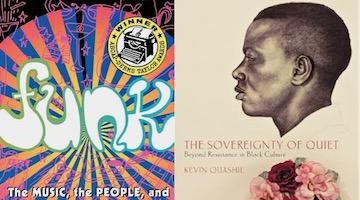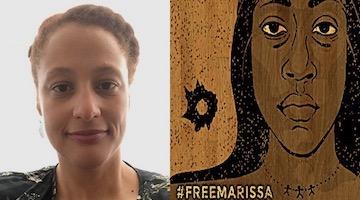Mutual aid work is part of actually addressing survival needs right now, and getting to the root causes of problems.
“Mutual aid is the onramp to social movement participation.”
In this series, we ask acclaimed authors to answer five questions about their book. This week’s featured author is Dean Spade. Spade isan Associate Professor at Seattle University School of Law, where he teaches courses on policing, imprisonment, gender, race, and social movements. His book is Mutual Aid: Building Solidarity During This Crisis (and the Next).
Roberto Sirvent: How can your book help BAR readers understand the current political and social climate?
Dean Spade: This book is trying to address some urgent questions about the current moment. First, it argues that the crises we are facing—the pandemic, the economic crisis, the climate crisis, the crises of racist policing, imprisonment, and immigration enforcement, and others—are worsening. It is a pivotal time for people to increase our ways of supporting survival and resistance to the systems that are making all these crises worse. The book is about how mutual aid—the grassroots work of meeting each other’s needs because we know the dominant systems won’t—is essential both to mobilizing hundreds of millions of people into vibrant political movements, and helping us survive the disasters we are living through.
I hope this book also specifically helps people think about the limits of corporate and government solutions to the problems we are all so worried about. We are seeing how the US government’s brutal failures to address COVID are causing hundreds of thousands of deaths and growing problems with poverty, housing insecurity, and lack of childcare. At the same time, what is getting people through is local mutual aid projects that help people eat and get medicine, that give out masks and hand sanitizer, and help people with rent and other essentials. No matter what happens in the election, we are going to need to keep growing this kind of mutual aid work, because we can’t count on politicians to let people out of prisons and jails (which are COVID death traps), to give people rent and mortgage relief, to make sure everyone has health care, to stop climate change or support people suffering in fires and storms, or to make sure people have income and do not have to go to work and get COVID. Whatever relief comes from the government will keep on putting more money in the hands of big corporations and leaving people out who are in the most need.
“What is getting people through is local mutual aid projects that help people eat and get medicine, that give out masks and hand sanitizer and and other essentials.”
I also hope this book is useful to people participating in the uprising against racist police violence that we have been seeing since the murder of George Floyd. This uprising has helped a lot more people think about the failures of reforms to police and prisons that have actually expanded police budgets and grown prisons and border enforcement for decades. This realization that the system tends to “solve” problems by growing itself and legitimizing itself but never getting to the root causes of those problems is so important. This book is about how mutual aid work is part of actually addressing survival needs right now, and getting to the root causes of problems. For example, many of us are pushing to defund the police and fund housing, child care, health care, and transportation, because we know that police don’t make us safe and we would all be safer if everyone had what they needed and no one was desperately poor. At the same time, people engaged in a huge range of mutual aid projects to keep each other safe and address harm when it happens are doing what criminalization can’t but mutual aid can: building safety in a local, grassroots way based on the wisdom of people closest to the harm.
What do you hope activists and community organizers will take away from reading your book?
The first half of the book is focused on the role that mutual aid plays in social movements. It talks about how mutual aid builds movements, because most people come to movements because they need help or because they want to help others facing immediate harm. Mutual aid is the onramp to social movement participation, and once people join mutual aid projects they get chances to grow their solidarities, learn new things about the issues and people affected beyond what first got them involved. In this way, mutual aid projects are overlapping and networked, and people practicing mutual aid also become part of other tactics to have each others’ backs and push for change, like direct action, street protest, taking over public space, and more.
The second half of the book gets into the details of how mutual aid groups can set themselves up to last. The same kinds of problems and stumbling blocks confront mutual aid groups over and over—difficulty with conflicts, decision-making, and burnout. The book provides detailed models for addressing these dynamics. I hope these are helpful for groups just starting out, or for groups that have been around a while and are running to these classic problems.
We know readers will learn a lot from your book, but what do you hope readers will un-learn? In other words, is there a particular ideology you’re hoping to dismantle?
One thing I hope people unlearn is the idea that help is coming from somewhere else. We are often told that if we don’t like what is going on, we should try to vote the right people in, or give money to the right non-profits, and hope that someone else (usually elites) will move the levers of power and deliver a solution. Mutual aid is about all of us rolling up our sleeves and addressing the problems we see in our communities directly. It means we help each other out, we imagine that we can come up with practical solutions to reduce harm and suffering right now and we don’t have to wait for permission from the authorities. As crisis conditions worsen around us and elites throw more fuel on the fires, this sense of our own capacities to work together to address problems is essential. No one is coming to bring us safety or security, we are going to have what we create together.
A second thing I hope we can all unlearn is the culture of hierarchy that we are forced to internalize in capitalist, white supremacist, heteropatriarchal societies. We learn that in groups we should either ram forward our view and try to out vote or steamroll other people’s ideas, or we should keep our heads down and agree to survive. At jobs, in schools, in families, we practice these two options over and over. We don’t get a lot of practice being truly interested in hearing people’s opposing ideas, building collective wisdom and trying to come up with proposals for ways forward that make sure not to leave anyone behind and also stay firm and clear in our beliefs and values. Inside mutual aid groups we can find opportunities to actually practice this and to unlearn the conditioned behaviors we’ve internalized. Doing so makes us more prepared to live in the world we are trying to build, one where we have meaningful collective self-determination over the conditions we live in, where we share things according to values of justice and care, and where we desire each other’s participation.
Who are the intellectual heroes that inspire your work?
Some of the people who have influenced my thinking the most are Mariame Kaba, Andrea Ritchie, Angélica Cházaro, Angela Davis, Harsha Walia, Craig Willse, Ruthie Gilmore, Rickke Mananzala, Nick Estes, Eli Clare, Haneen Mikey, Chandan Reddy, Morgan Bassichis, Beth Richie, Elliott Fukui, Jason Lydon, Colby Lenz, Mia Mingus, Nathan Shara, Noura Erakat, Gord Hill, Dorothy Roberts, Tourmaline, Peter Gelderloos, J. Kehaulani Kauanui, Rod Ferguson, Chris Hanssmann, Emily Thuma, Cathy Cohen, and Eric Stanley.
In what way does your book help us imagine new worlds?
Right now, a lot of people are deeply considering what it means to imagine defunding the police, and that raises all the big questions about the role of the government in our lives. We have been raised to believe that cops and militaries make us safe. And it is true that these armed forces create the current status quo, with all of its uneven forms of violence and safety for different people at different times. It can be really overwhelming and scary to think about really getting rid of these things. At the same time, the status quo has always been changing, and we’re facing drastic upheaval from climate change, economic collapse, and political turmoil. It makes sense to worry about what all of this is bringing and will bring.
But since we can’t stop the big changes that are happening, and we wouldn’t want to return to any of the prior status quo conditions of colonialism, white supremacy, and heteropatriarchy, this is actually the moment to expand our capacities to imagine new ways of living together and immediately put into place practices that build new social relations. Mutual aid is just that. Mutual aid is us taking care of each other, deepening our relationships with each other, increasing our skills for making decisions together and redistributing essentials together and addressing conflict together. Mutual aid is a world-making practice, since the world is made up of our relationships to one another and the actions we take with each other. I hope this book offers a chance to see the connection between very ordinary actions like delivering groceries to each other or changing a diaper or writing to a prisoner, and the entirely new ways of living that we want and need. Those new ways of living are based in care not profit, oppose coercion and control, and ensure that no one is considered disposable.
Roberto Sirvent is Professor of Political and Social Ethics at Hope International University in Fullerton, CA, and an Affiliate Scholar at Yale University’s Interdisciplinary Center for Bioethics, where he directs the Race, Bioethics, and Public Health Project. He is co-author, with fellow BAR contributor Danny Haiphong, of the book, American Exceptionalism and American Innocence: A People’s History of Fake News—From the Revolutionary War to the War on Terror.
COMMENTS?
Please join the conversation on Black Agenda Report's Facebook page at http://facebook.com/blackagendareport
Or, you can comment by emailing us at comments@blackagendareport.com















